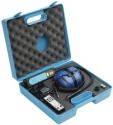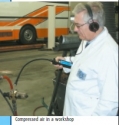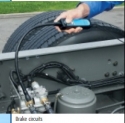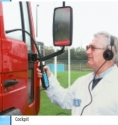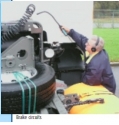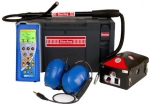FLEX.US ultrasonic leak detector
PRESSURE LEAKS IN VEHICLE AIR BRAKE SYSTEMS
PRESSURE LEAKS IN COMPRESSED AIR SYSTEMS
TIGHTNESS INTEGRITY OF ANY ENCLOSED VOLUM
HEAR MORE
Compressed air leaks = wasted money.
Compressed air leaks account for between 30 and 40% of the total air demand in a factory. The compressor room ranks as the 3rd highest consumer of energy in most facilities. Finding and fixing leaks is the best opportunity we have for both energy and operating cost reduction.
A leak = danger
Detecting pneumatic leaks in vehicle brake systems is a high priority measure that ensures safer vehicles on our roadways.
Tightness integrity problems = quality and comfort problems. To verify the tightness of any volume (vehicles, aircraft, clean rooms, building envelope, nuclear containment walls, etc…) you need the reliability and precision of the ultrasonic testing method.
HEAR MORE with the SDT FLEX.US ultrasonic detector.
The FLEX.US wears the sign of a market leader. It is the product of a wealth of experience gained by SDT International in predictive maintenance, the detection of leaks and quality control in all sectors. The success of SDT is based on its desire to supply efficient solutions that meet the needs of clients so that they can improve their profitability.
Appearances are not deceiving… The FLEX.US is a solid tool, built to last, easy to use. Expect the same level of quality synonymous with the SDT name. Leak detection is serious business that requires reliable tools. Choosing the right tool can mean the difference for a successful leak detection program.
HEAR MORE: The reliability of the SDT FLEX.US is unmatched.
- The SDT FLEX.US indicates the presence of a leak by producing a quality signal that is truly representative of that leak. In fact each leak has its own unique "sound print". Some detectors merely produce an electronic "beep" when an ultrasonic signal is present. An operator has no way of knowing if the source of that beep is a leak or some other ultrasonic phenomena.
- To ensure comfort, the volume control is quickly adjusted when very loud ultrasounds are encountered. This sensitivity provides a high level of precision making leak detection a pleasure, not a chore.
Moreover the SDT FLEX.US is provided with a double operation adjustment: continuous or non-continuous.
- The design of the FLEX.US is based on the popular “Flexible Sensor” from SDT. Mounted on the end of a flexible steel pipe, the ultrasonic sensor can access any hard-to-reach location. Bend, twist, and curve your FLEX.US to suit your inspection. Safely scan electrical cabinets and behind machinery guards without putting your hands in danger.
HEAR MORE: Leaks produce ultrasonic noise and the SDT FLEX.US lets you hear and trace them.
- The SDT FLEX.US detector works like a super microphone, sensitive only to high frequency ultrasounds. Using a sensitive piezoelectric crystal as a sensor element, minute high frequency sound waves excite or "flex" the crystal creating an electrical pulse that is amplified and then "heterodyned" or translated into an audible frequency that the technician can hear through a pair of noise reduction headphones.
- As a leak passes from a high pressure to a low pressure, it creates turbulence. The turbulence generates a high frequency sound component, which is detected by the sensitive piezoelectric element, allowing the technician to quickly guide the instrument to the loudest point in order to pinpoint the leak.
The SDT FLEX.US enables you to hear the presence of a leak by producing a quality signal that is truly representative of that leak. In fact each leak has its own unique "sound print".
- Leaks are generally found by moving the detector back and forth and up and down in the direction of the leak source. The source of the leak is therefore easy to pinpoint by following the loudest signal. High levels of ambient factory noise do not affect the SDT FLEX.US. Its design is a unique approach to traditional testing methods.
- Tightness integrity of closed volumes (cab of a vehicle, cockpit of an aircraft, building envelope, etc…) is performed by using the FLEX.US in conjunction with the SDT 200mW Bi-sonic Transmitter (available as option) to place inside the volume to be tested. The volume is considered to be tight if the sound levels remain constant around the entire seam. A leak is indicated by a sudden increase in volume.
|
Controls |
Continuous or non-continuous operation switch. |
|
Amplification |
7 levels: 20, 30, 40, 50, 60, 70 and 80 dB. |
|
Ultrasound sensor |
Open sensor with a 16 mm (1/2ӯ) diameter (19 mm - 3/4ӯ - exterior), central frequency of 40 kHz. |
|
Detected frequencies |
38.4 kHz, ± 2 kHz (- 3dB). |
|
Audio output |
Stereo jack connector of 6.35 mm (1/4”) (use only the headset supplied with the unit). |
|
Power |
Two alkaline AA batteries, 1.5 V. Rechargeable batteries can also be used. |
|
Usage time |
± 20 hours. This can vary based on several variables including the charge of the batteries, the level of amplification used and the quality of the batteries. |
|
Body |
Made with machined and assembled sheets of high impact polystyrene, it is also shock resistant. |
|
Dimensions |
Body: 170 x 42 x 31 mm (6.70 x 1.65 x 1.22 inches) |
|
Flexible tube length |
400 mm (15.75 inches). |
|
Weight |
412 grams with the batteries (14.53 ounces). |
|
Operating temp. |
From -10°C to +50°C / 14°F to 122°F. |









 ROM
ROM ENG
ENG


